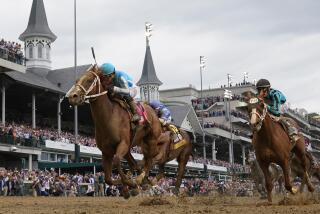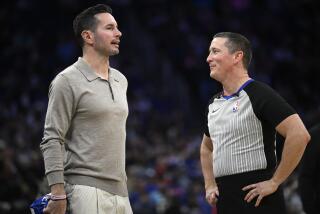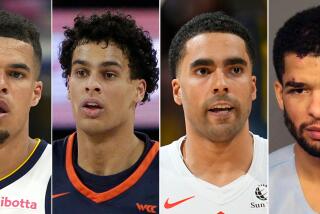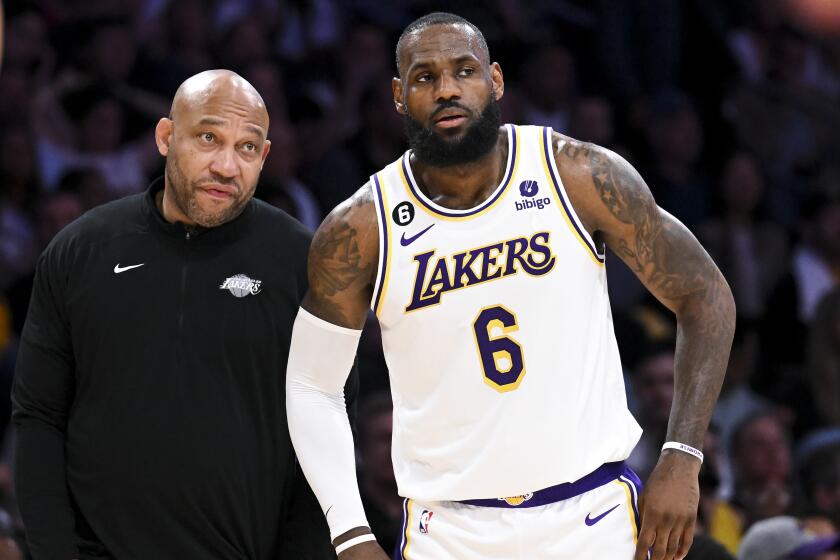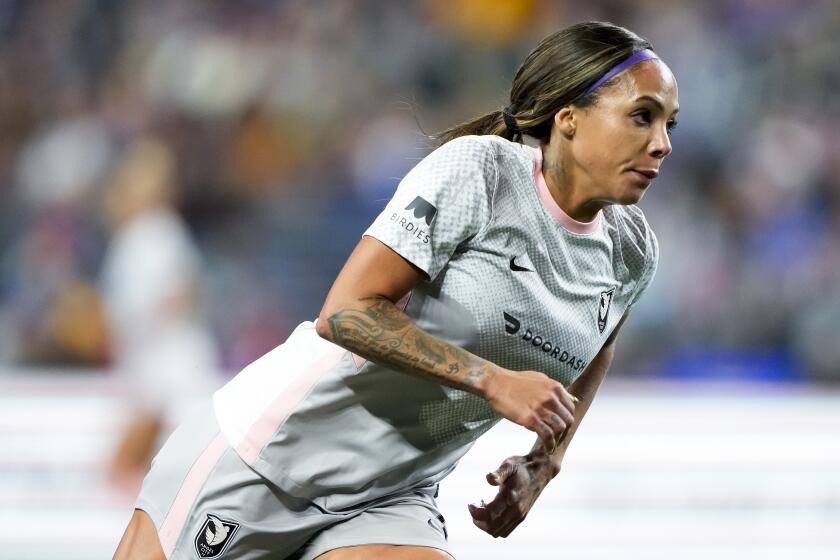Sports Talk : Longtime Player in Local Scene Has Big Hopes for Soccer in U.S.
Hugo Salcedo has been a key player in the Los Angeles soccer scene for three decades.
In the early 1960s, as a teen-ager, he played in adult leagues because there were not many organized youth soccer programs. Later he starred at USC. In 1984, he served as venue coordinator for soccer at the Los Angeles Olympics. He now heads a firm that promotes the sport.
With the revamping of the U.S. Soccer Federation, Salcedo could make his mark in the organizing of the 1994 World Cup, which will be held in several U.S. cities.
Salcedo, who played for the U.S. team at the 1971 Pan American Games and the 1972 Olympics, is in the running for a spot within the USSF. At least that is what the federation’s new boss, Alan Rothenberg, who was the soccer commissioner at the ’84 Olympics, told him. “I will have a position,” said the 44-year-old Salcedo.
Rothenberg, the former president of the Los Angeles Clippers of the National Basketball Assn., was elected in August to direct the USSF. He has set out to reorganize the federation and is looking to people like Salcedo to help him do it. He also has persuaded Franz Beckenbauer to become a consultant to the federation. Beckenbauer coached the West Germans to this year’s World Cup title.
Salcedo believes that getting Beckenbauer is a major step for the U.S. soccer program. “He’s a leader in soccer,” Salcedo said. “We need teachers of the game, people who can help coaches with instructions they can pass to the players. I think that’ll be his role.”
Salcedo is interested in building a stronger base for U.S. soccer by, among other things, developing an outdoor professional league that would be able to mature instead of die in infancy like its predecessors. That also is a Rothenberg priority.
“If you look at the statistics, we have a tremendous influx of youngsters coming into the youth leagues, but they start dropping out at around 14 because there’s nothing to look forward to in the sport,” Salcedo said.
Most of the top U.S. talent--players like Tab Ramos, Paul Caligiuri and Hugo Perez--are forced to play in European leagues not only to make a living but to face first-rate competition. They are the nucleus of what Salcedo figures will be a much-improved U.S. World Cup squad in 1994.
“We should have a pretty solid team,” Salcedo said. “The experience they’ll get over in Europe is very important. I will venture to say we’ll go on to the second round.”
Whether the U.S. team lives up to Salcedo’s expectations will be decided four years down the road, but the one thing he sees almost as a certainty is that Los Angeles will be a major factor in holding the quadrennial event.
“I believe that we’ll be one of the main locations, one of the top three cities with a good shot at having the finals,” he noted. “We attracted 103,000 (at the Rose Bowl) for the (soccer) finals of the Olympics in ’84. It already has been proven that Los Angeles is the international sports capital of the world.”
Both the Rose Bowl in Pasadena and the Los Angeles Memorial Coliseum are being considered by the USSF as venues for the ’94 World Cup. But some think that the federation will not pick Los Angeles for the closing matches, opting instead for newer facilities such as Joe Robbie Stadium in Miami and even some indoor arenas.
Salcedo disagrees.
“It doesn’t necessarily have to be the best stadium to host the finals,” he said. “For example, in Italy the stadium in Milan was so beautiful and accommodating, but they still had the final games in Rome, in a stadium that was built for the 1960 Olympics.”
Salcedo got to see the Italian venues firsthand as an international general coordinator for the International Federation of Football Assn., a duty he has handled for the last five years.
He had similar tasks in Puebla during the 1986 World Cup in Mexico, at Chilean and Saudi venues during the 1987 and 1989 junior world championships, and at the Rose Bowl in 1984.
Soccer has been Salcedo’s passion since he was growing up in Guadalajara and later in Los Angeles. He tried unsuccessfully to make Mexico’s team for the 1968 Olympics but finally realized his goal in 1972 at Munich with the U.S. team. That year, Salcedo said, was a special one for him.
“It was one of the best years of my life,” he recalled. “I had my first boy, Jorge. I went to the Olympics. And I graduated from USC.”
Salcedo still has a link with the university; he is on his second stint as a clinical social worker at County-USC Medical Center. He is also president of the East Los Angeles-based International Soccer Group, which puts on tournaments for players of all ages and provides other services related to the sport.
And he is an anxious father who closely watches the soccer careers of Jorge, a promising midfielder who is in a pool of 30 finalists for the 1992 U.S. Olympic team, and another son, 14-year-old Eddie, who plays in clubs near the family’s home in Cerritos.
“I hope fate repeats itself. Twenty years after I played in the Olympics, maybe he’ll have his chance to do the same,” Salcedo said of Jorge.
And two years after that, there may be a Salcedo on the field as the United States plays host to soccer’s greatest extravaganza--with Hugo Salcedo helping to run the show.
More to Read
Get our high school sports newsletter
Prep Rally is devoted to the SoCal high school sports experience, bringing you scores, stories and a behind-the-scenes look at what makes prep sports so popular.
You may occasionally receive promotional content from the Los Angeles Times.
